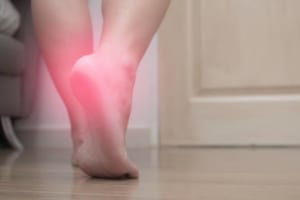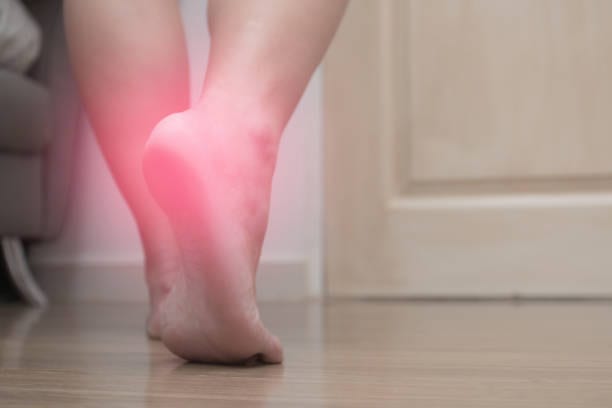How to heal your heel and banish Plantar Fasciitis!

Do you experience pain in or near your heel, especially when getting out of bed first thing in the morning? If so, the chances are that you could be one of the 10% of people who suffer from Plantar Fasciitis. It’s a common but painful condition, and one that I’m frequently asked about in both my Central London and North London Osteopathic clinics.
Plantar Fasciitis is caused by an inflamed or swollen plantar fascia. This is the strong band of tissue that stretches all the way from your heel bone to your toes. Basically, its function is to support your foot arch and act as a shock absorber within your foot. But repeated small injuries to the fascia (for any number of reasons) can result in inflammation and pain, often where the plantar fascia attaches to your heel. Here, too, you might also get a bony spur on your heel bone (calcaneum) thanks to a build-up of calcium.
Symptoms of Plantar Fasciitis
- Pain and tenderness under the heel (and often about 4cm forward from your heel) when standing up and placing weight on the foot, especially first thing in the morning or after prolonged sitting
- Stiffness in the arch of the foot
- Difficulty in raising your toes off the floor
Triggers for Plantar Fasciitis
Damage to the plantar fascia can be brought on by various situations and lifestyle factors:
- Excessively standing, walking or running (especially on hard surfaces), causing overuse or stretching of your sole
- Having either high arches or flat feet
- Wearing shoes that don’t fit properly, that are too flat or provide minimal cushioning for the sole and heel
- Being overweight, thereby placing extra strain on your heel
- Having a tight Achilles tendon, impairing the mobility of your ankle
Treatment and future prevention for Plantar Fasciitis
Although fascia tissue generally heals slowly, sometimes taking several months, the good news is that Plantar Fasciitis pain does ease over time, aided by lifestyle changes such as:
- Resting and not putting too much weight on the affected heel
- Wearing well-fitting shoes, preferably with a 2-3cm heel (for both men and women), avoiding going barefoot wherever possible and using a cushioned insole for extra protection
- If you’re a runner or jogger, buying your training shoes from a specialist running shoe shop
- Fitting in at least 20- or 30-minutes’ gentle movement each day, starting with walking if you’re a beginner – regular exercise promotes flexibility and a healthy lifestyle
- Warming up and cooling down before exercising, including daily calf and plantar fascia stretches (such as rolling a plastic bottle of water under the affected foot for 15 minutes twice a day)
- Losing weight (slowly and steadily) if you need to
If your heel pain is persistent, please come to see me at one of my Osteopathic clinics. I will take a detailed case history, assess your feet – how you stand and walk – and check out the relationship between your pelvis, leg and foot. If you do have Plantar Fasciitis, I will offer lifestyle advice to aid recovery and prevent future recurrences. In terms of treatment there are two very effective options:
- Low Level Laser Therapy (LLLT) uses low power or ‘soft’ laser light to aid and speed up your body’s natural healing process safely and effectively
- Osteopathy and Western Acupuncture used in combination (and if relevant) will help to address underlying biomechanical issues in your legs and pelvis that may be affecting your Plantar Fascia
Kind words from sufferers of Plantar Fasciitis
Here’s what one patient said to me recently: “Robin diagnosed that I had developed mild Plantar Fasciitis. He treated me with a Low Level Laser Therapy, which took away any pain by the next day; it’s very effective. The next week he repeated the treatment and, consequently, I have no further symptom. My problem could have developed into full-blown Plantar Fasciitis but, because of Robin’s use of Low Level Laser Therapy, the symptom was prevented from becoming more advanced!”
Please click here to request a consultation with me in either the North or Central London Robin Kiashek clinics.




